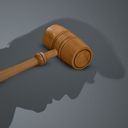Supreme Court probes assassinations and coups in Trump immunity hearing

Could a president really have political opponents assassinated or carry out a coup in the U.S. without facing a criminal trial?
- That "absolute immunity" claim was what Donald Trump's lawyer argued before the Supreme Court, whose justices appeared unwilling to go that far — but still seemed poised to hand the ex-president a partial victory.
Why it matters: The immense gravity of the case weighed heavily on the Supreme Court on Thursday, with justices across the ideological spectrum expressing fears of the new order they could unleash.
- The immediate question is whether Trump will face trial in his Jan. 6 criminal case before the 2024 election. But the conservative-led court's decision will shape history well beyond November.
- "We're writing a rule for the ages," Justice Neil Gorsuch observed.
Driving the news: For now, Trump seems likely to win at least a delay from the high court, as several justices expressed skepticism — based on oral arguments — of the charges brought by special counsel Jack Smith.
- The court appeared set to broadly reject Trump's sweeping claim of absolute immunity, which liberal justices said would open the door for a president to commit serious crimes with no consequences.
- But some justices signaled that presidents should have a degree of protection for "official acts" they carry out in office.
What to watch: One potential outcome is that the Supreme Court kicks the debate over what constitutes an "official act" — including in the context of Trump's indictment — down to the lower courts.
- That would delay his trial considerably — and may leave some of the biggest answers about presidential immunity unanswered.
What they're saying: Liberal and conservative justices diverged sharply on their views of what presidential immunity — or lack thereof — could mean for the future of politics and prosecutions.
- "If there's no threat of criminal prosecution, what prevents the president from just doing whatever he wants?" Justice Ketanji Brown Jackson asked. "I'm trying to understand what the disincentive is from turning the Oval Office into the seat of criminal activity in this country."
- Justice Brett Kavanaugh, meanwhile, expressed alarm over the future threat of partisan prosecutors investigating presidents: "It's not going to stop: It's going to cycle back and be used against the current president and the next president and the next president after that."
Zoom in: Liberal justices tested the limits of Trump lawyer D. John Sauer's immunity argument with a series of provocative hypotheticals.
- "If the president decides that his rival is a corrupt person and he orders the military to assassinate him, is that within his official acts for which he can get immunity?" Justice Sonia Sotomayor asked.
- "How about if the president orders the military to stage a coup?" asked Justice Elena Kagan.
In both scenarios, Sauer responded that it depends on the circumstances — but that they could well be "official acts" protected by presidential immunity.
- "If it's an official act, there needs to be impeachment and conviction before" any criminal prosecution, Sauer argued.
- "It certainly sounds very bad, and that's why the framers have a whole series of structural checks that have successfully — for the last 234 years — prevented that very kind of extreme hypothetical."
The intrigue: Under questioning from Justice Amy Coney Barrett — a Trump appointee — Sauer conceded that some of the allegations described in the Jan. 6 indictment were "private," not "official" acts.
- That includes Trump's alleged participation in the scheme to submit fraudulent slates of electors in battleground states won by President Biden.
- It was a remarkable acknowledgment by Sauer that Trump is not immune from all of the charges he faces, potentially allowing prosecutors to proceed to trial with a narrower indictment.
The bottom line: 240 miles away, Trump spent the day in a New York courtroom with a jury that could render a criminal conviction well before the Supreme Court issues a ruling in his federal case.